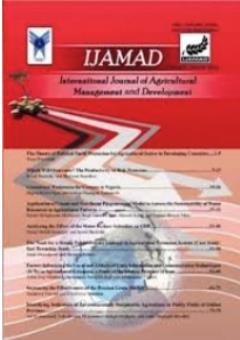Determinants of Information Communication Technology Utilization for Service Delivery among Extension Agents in Ondo State, Nigeria
Subject Areas : Environmental policy and management
Keywords: Information and communication technologies, awareness, usage, extension agents, ICT tools, Nigeria,
Abstract :
The study determines the level of ICT tools awareness, the extent of usage, assesses the constraint in using ICTs for agricultural extension service delivery and clarifies the relationships between selected socio-economic characteristics and the use of ICTs. Data were collected through a questionnaire distributed to 40 respondents using purposive sampling. The data was analyzed by descriptive (mean, frequency, standard deviation) and inferential statistics (Chi-square and PPMC). Findings revealed that levels of ICT tools awareness (x̄=3.95) and usage (x̄= 2.31) were high and low respectively. Lack of electricity/power failure (x̄=4.05), insufficient facilities (x̄=3.97), ICT illiteracy (x̄=3.88), non-availability of ICT facilities in ADP offices (x̄=3.85), lack of support from the government and bad policies (x̄=3.81), lack of support from ADP administration (x̄=3.80), lack of access to ICT tools (x̄=3.77), corruption in the governance structure (x̄=3.75) and high cost of ICT facilities (x̄=3.74) were very serious constraints in using ICTs for extension work. There was a significant relationship between gender (χ2=0.362, p<0.05), religion (χ2=2.511, p<0.05), and awareness of ICT tools. Also, a significant relationship existed between educational level (r=0.313, p<0.01), monthly salaries (r=0.267, p<0.05), and the extent of ICT usage among extension agents. Governments should design a policy that will focus on awareness, access, and use of ICTs among the extension agents and provide an alternative source of power. This will enable them to remain within the system and increase their ICT usage in extension service delivery.

